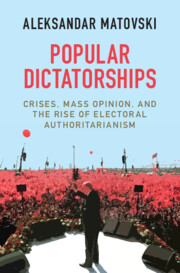Book contents
- Popular Dictatorships
- Popular Dictatorships
- Copyright page
- Dedication
- Contents
- Figures
- Tables
- Acknowledgments
- 1 A “Perfect Dictatorship?” The Puzzle of Electoral Authoritarianism
- 2 Crises, Popular Opinion, and Electoral Authoritarianism
- 3 The Crisis Roots of Electoral Authoritarianism: A Macro-Level Analysis
- 4 The “Strongman” Electoral Authoritarian Appeal: A Comparative Analysis
- 5 Crises, Popular Opinion, and the Realignment of Political Competition in Russia
- 6 Is Russia Unique? The Strongman Heresthetic in Comparative Perspective
- 7 Conclusions and Implications
- Bibliography
- Index
5 - Crises, Popular Opinion, and the Realignment of Political Competition in Russia
Published online by Cambridge University Press: 04 November 2021
- Popular Dictatorships
- Popular Dictatorships
- Copyright page
- Dedication
- Contents
- Figures
- Tables
- Acknowledgments
- 1 A “Perfect Dictatorship?” The Puzzle of Electoral Authoritarianism
- 2 Crises, Popular Opinion, and Electoral Authoritarianism
- 3 The Crisis Roots of Electoral Authoritarianism: A Macro-Level Analysis
- 4 The “Strongman” Electoral Authoritarian Appeal: A Comparative Analysis
- 5 Crises, Popular Opinion, and the Realignment of Political Competition in Russia
- 6 Is Russia Unique? The Strongman Heresthetic in Comparative Perspective
- 7 Conclusions and Implications
- Bibliography
- Index
Summary
Chapter 5 introduces the analysis of popular opinion in electoral autocracies with a comparative analysis of the paradigmatic case of Russia. The chapter first outlines the scope and consequences of Russia’s catastrophic post-Communist cataclysm, and how this traumatic experience prompted ordinary Russians to place an absolute premium on restoring order and stability – outlooks that made Vladimir Putin’s tough-mannered style of governing incredibly popular. Using a uniquely rich dataset of 418 surveys for the 1993-2011 period, produced by Russia’s Levada Center, this chapter demonstrates that in societies traumatized by upheaval, the strongman appeal trumps ideological, programmatic, and value orientations, and aligns mass opinion and political competition along a new cleavage: the choice of whether to accept or reject electoral authoritarianism as a regime that can impose order. I show that this cleavage inhibits and divides the opposition and highlights its shortcomings, allowing even weakly performing autocracies to retain power through elections.
Keywords
- Type
- Chapter
- Information
- Popular DictatorshipsCrises, Mass Opinion, and the Rise of Electoral Authoritarianism, pp. 167 - 221Publisher: Cambridge University PressPrint publication year: 2021

